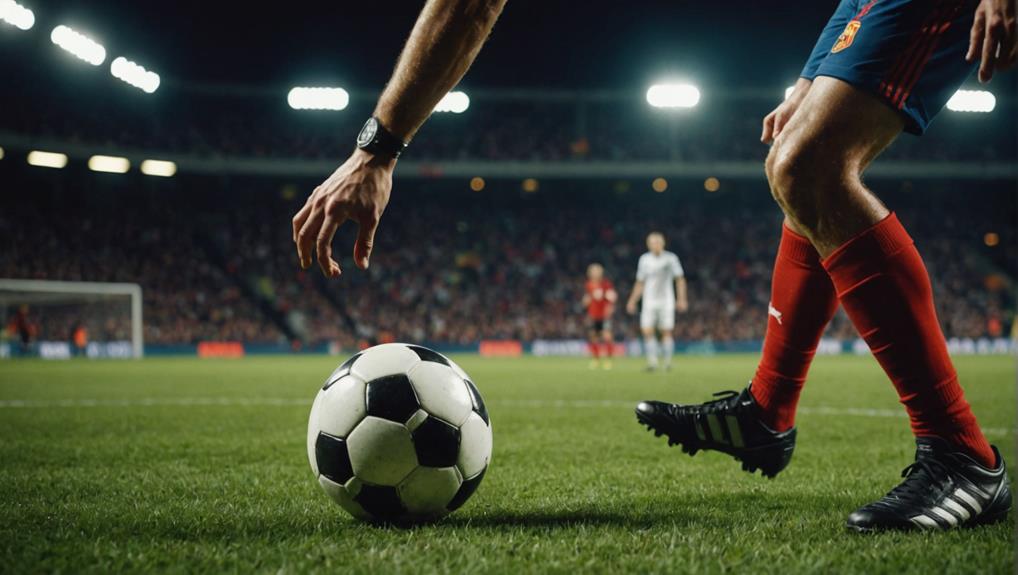
Hand Ball in Soccer: Rules and Controversies
July 7, 2024In soccer, handball occurs when a player deliberately handles the ball, including scoring with their hand/arm. Referees scrutinize intent to determine violations, especially in the penalty area. Accidental handballs leading to goals may be allowed if unintentional. Controversies arise due to subjective interpretations of handball incidents, affecting match outcomes. Video Assistant Referee (VAR) reviews play a pivotal role in decision-making, but consistency remains a challenge. Notable historical handball moments have reshaped games and discussions in soccer. As you explore further, discover the evolving rules, impacts on different leagues, and potential future changes in handball regulations.
Handball Definition and Interpretation
Understanding the definition and interpretation of handball in soccer is essential for both players and referees to maintain fair play on the field.
The handball rule dictates that a player commits an offense if they deliberately use their hand or arm to touch the ball. When interpreting handball incidents, referees pay attention to whether the player's body was unnaturally enlarged by the hand or arm during the contact.
Importantly, scoring a goal with the hand or arm is considered a handball offense, even if it occurs in the opponent's net. Referees focus on deliberate actions, determining if the player intentionally handled the ball.
However, if a goal is scored accidentally with the hand or arm, it may be allowed if the scorer wasn't the one who made contact with the ball. This nuanced interpretation of handball incidents plays a significant role in ensuring the integrity and fairness of soccer matches.
Handball Offenses and Penalties
Let's talk about the key points surrounding handball rules in soccer.
You'll learn about the offenses that lead to penalties, the consequences of a penalty kick, and the controversies surrounding VAR reviews.
Stay tuned for a detailed breakdown of these vital aspects in the game.
Handball Rules Explained
Handball offenses in soccer encompass deliberate hand/arm contact, body size manipulation, and scoring using hand/arm in the opponents' goal. Understanding handball rules is important as penalties are awarded for violations, especially for intentional handballs or when the hand/arm is in an unnatural position.
Referees closely assess deliberate actions to determine handball offenses during matches, focusing on the player's intent. Accidental handballs leading to goals may sometimes be allowed if the scorer isn't the one who handled the ball.
Delving into the nuances of handball rules is essential for players, coaches, and fans to comprehend the implications of handball incidents in soccer matches. The controversies surrounding handball decisions often arise due to the subjective nature of these calls and the interpretation of deliberate versus accidental actions.
Keeping abreast of the intricacies of handball rules can help clarify such contentious moments in soccer games.
Penalty Kick Consequences
Penalty kicks resulting from handball offenses in soccer games can heavily influence match outcomes and player disciplinary actions. When a handball offense occurs in the penalty area, the opposing team is typically awarded a penalty kick.
Defenders risk conceding a penalty kick if the ball strikes their arm in an unnatural position, leading to potential game-changing moments. Referees rely on VAR to review handball incidents within the penalty area before awarding a penalty kick, ensuring fair decisions are made.
Additionally, players committing deliberate handball offenses that result in a penalty kick can receive yellow cards as a form of disciplinary action. The impact of these penalty kicks on a match is immense, as they often decide the victor and can alter the course of the game dramatically.
Hence, staying vigilant and avoiding handball offenses in critical areas like the penalty box is essential for teams to secure favorable outcomes.
VAR Review Controversies
When it comes to VAR review controversies surrounding handball offenses and penalties in soccer, the impact on match outcomes can't be underestimated. VAR reviews have revolutionized the way handball incidents are assessed, but they've also sparked debates and controversies within the soccer community.
Here are some key points to ponder:
- Interpretations Vary: Different leagues have their own interpretations of handball rules when it comes to VAR reviews, leading to inconsistencies in decision-making.
- Match Outcomes Altered: Referees rely on VAR to determine whether a handball offense warrants a penalty kick, directly influencing the results of soccer matches.
- Consistency and Accuracy: While VAR aims to bring consistency and accuracy to handball decisions, its application has been met with mixed reactions from players, coaches, and fans.
- Debates Persist: Despite the improvements in officiating, debates surrounding VAR interventions in handball incidents continue to dominate headlines, showcasing the ongoing controversies in soccer.
Handball Controversies in Soccer
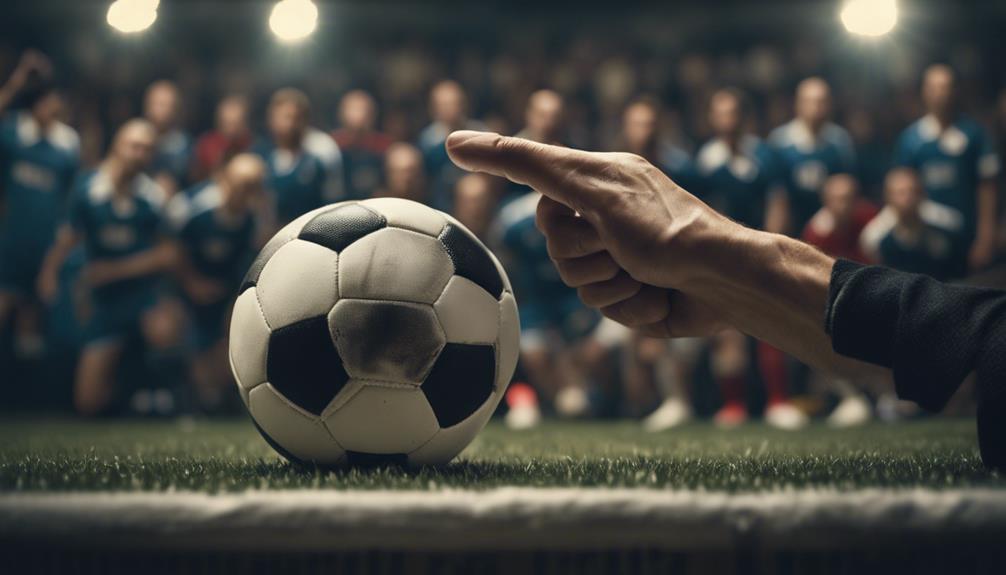
Controversies surrounding handball incidents in soccer have ignited heated debates within the sport's community. The ongoing handball controversies have raised concerns about the use of VAR technology to assess these decisions.
The distinction between deliberate handball and accidental contact remains a significant point of contention, leading to calls for clearer guidelines and enforcement consistency. Moments like Maradona's infamous Hand of God goal have left a lasting impact on how handball rules are perceived and interpreted in soccer.
One of the main challenges in handball controversies is the subjective nature of determining intent, which often puts referees in difficult positions. Referees face the constant challenge of making split-second decisions in high-pressure situations, adding to the complexity of enforcing handball rules effectively.
The need for more transparent and consistent enforcement methods is evident in light of the increasing number of controversial handball decisions affecting the outcomes of important matches.
VAR and Handball Decisions
The introduction of VAR in soccer has greatly impacted the assessment of handball decisions, leading to increased scrutiny and improved accuracy. VAR plays a vital role in determining whether a handball incident warrants a penalty, contributing to more precise rulings.
However, interpretations of handball rules can vary among different leagues, sparking controversies within the soccer community. Referees utilizing VAR focus on key factors like the location of the offense in the box and whether the handball was intentional. This meticulous review process has introduced consistency and enhanced the accuracy of evaluating handball incidents during soccer matches.
Impact of Intent on Handball Calls
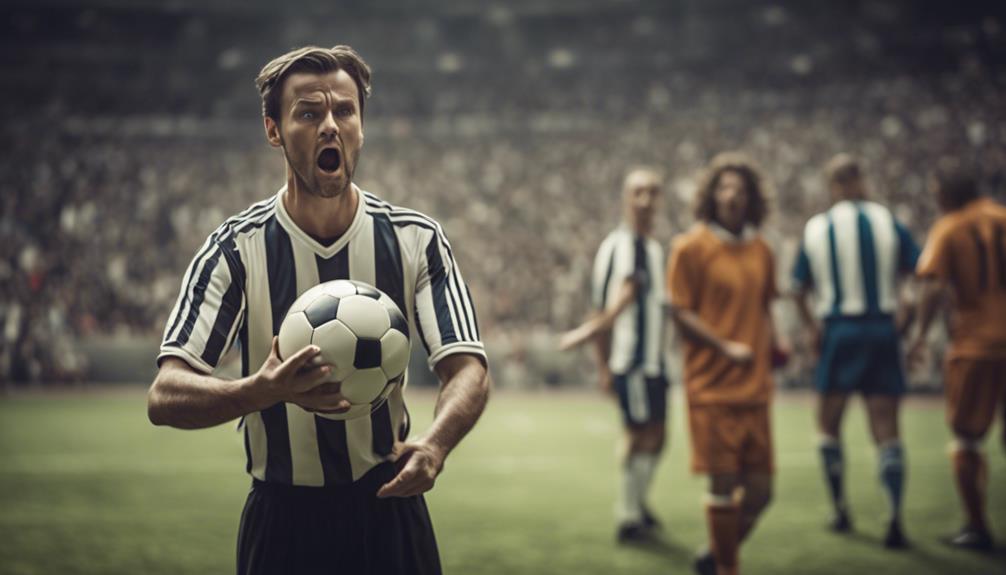
Determining the impact of intent on handball calls is essential in evaluating player actions during soccer matches. When it comes to handball offenses, the player's intentions are a vital aspect that referees consider.
In deliberate handball situations, where a player intentionally handles the ball, the question of intent becomes paramount. Referees have the authority to judge whether a handball was deliberate or accidental, taking into account the player's actions and movements leading up to the incident.
Defenders, in particular, need to be cautious about making their body unnaturally bigger to block a shot or pass, as this can lead to a handball offense, irrespective of their intent.
The laws of the game draw a clear line between intentional handballs and accidental touches, emphasizing the significance of intent in determining handball offenses. Therefore, understanding and judging intent play a pivotal role in making fair and accurate handball decisions during soccer matches.
Notable Handball Incidents in Soccer
Explore infamous handball moments in soccer and the impact of VAR on these incidents.
From Thilo Kehrer to Marcus Rashford, these notable cases shed light on the nuances of handball calls and the role of technology in decision-making.
Discover how proximity to the ball can influence the outcome of penalty calls, sparking debates and expressions of surprise among players, fans, and officials alike.
Infamous Handball Moments
Among the most infamous handball moments in soccer history are instances involving some of the sport's biggest stars and most controversial decisions. These incidents have sparked debates on fair play, the role of technology in the game, and the impact of referee's decision-making.
Here are some notable handball moments:
- Diego Maradona's 'Hand of God' goal against England in the 1986 World Cup, where he used his hand to score a pivotal goal.
- Thierry Henry's handball assist leading to a goal for France against Ireland in a World Cup qualifier, resulting in Ireland's elimination and widespread controversy.
- Luis Suarez's deliberate handball on the goal line during the 2010 World Cup quarterfinals, denying Ghana a winning goal and leading to Uruguay's victory.
- Lionel Messi's controversial handball goal for Barcelona against AC Milan in the Champions League, raising questions about intentional handball and the referee's decision-making.
These moments continue to be remembered in soccer history for the impact they'd on games and the ongoing discussions they sparked.
VAR Impact on Handballs
With the introduction of VAR in soccer matches, handball incidents have come under increased scrutiny, impacting the outcomes of games and sparking debates among fans and officials alike. VAR has revolutionized how handball incidents are reviewed, with notable cases like Thilo Kehrer's and Marcus Rashford's goals being influenced by VAR decisions.
The rules stipulate that a player involved in a handball incident can't score directly from that play, adding complexity to VAR assessments. VAR's intervention in handball incidents has led to varying decisions, fueling controversies and debates within the soccer community.
Deliberate actions leading to handball offenses are closely examined under VAR, determining whether penalties should be awarded. This technology hasn't only changed the way handballs are officiated but has also brought a new level of precision and accountability to the enforcement of handball rules in soccer matches, challenging players, fans, and officials to adapt to its impact.
Evolution of Handball Rules
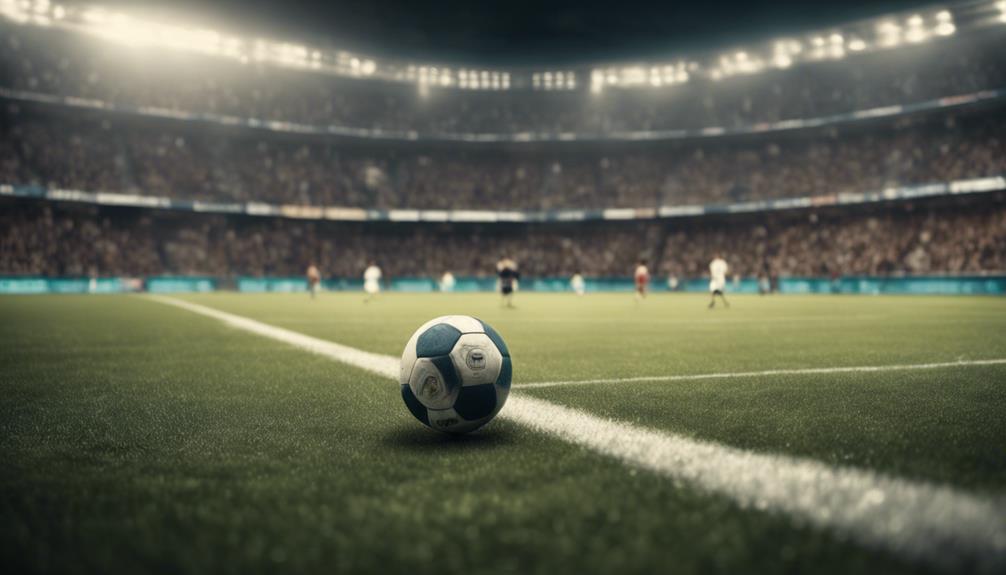
Handball rules in soccer have undergone significant evolution to adapt to the sport's changing dynamics, with historical changes tracing back to the 19th century. Here's how these adaptations have shaped the game:
- FIFA and IFAB have played pivotal roles in modifying handball rules throughout history, including landmark decisions like banning goalkeepers from handling back passes in 1992.
- The introduction of VAR in 2018 marked a new era in handball scrutiny, enabling more precise and consistent rulings on handball incidents during matches.
- Despite advancements, subjectivity in handball interpretations remains a challenge for referees, highlighting the ongoing struggle for uniformity across different leagues.
- The continuous evolution of handball rules underscores the sport's commitment to ensuring fairness, clarity, and consistency in the enforcement of these regulations, ultimately aiming to enhance the integrity of the game.
Handball Rules in Different Leagues
The implementation of handball rules in different soccer leagues reflects varying approaches to interpreting and enforcing regulations, contributing to the diverse penalty statistics observed across top-tier competitions.
In the Premier League, approximately 16.7% of penalties are awarded due to handball incidents, showcasing a moderate enforcement of handball rules.
On the other hand, the Bundesliga takes a stricter stance, with the highest percentage of penalties awarded for handball at 27.5%.
UEFA Champions League matches exhibit an even more stringent application of handball rules, with about 42.3% of penalties given for handball offenses.
It's notable that UEFA competitions generally have stricter handball rules compared to domestic leagues, leading to more penalties being awarded for handball incidents.
These differences in interpretations and enforcement of guidelines have sparked controversies among fans, players, and officials, highlighting the need for a consistent approach to handball rules across different leagues and competitions.
Future Changes to Handball Laws
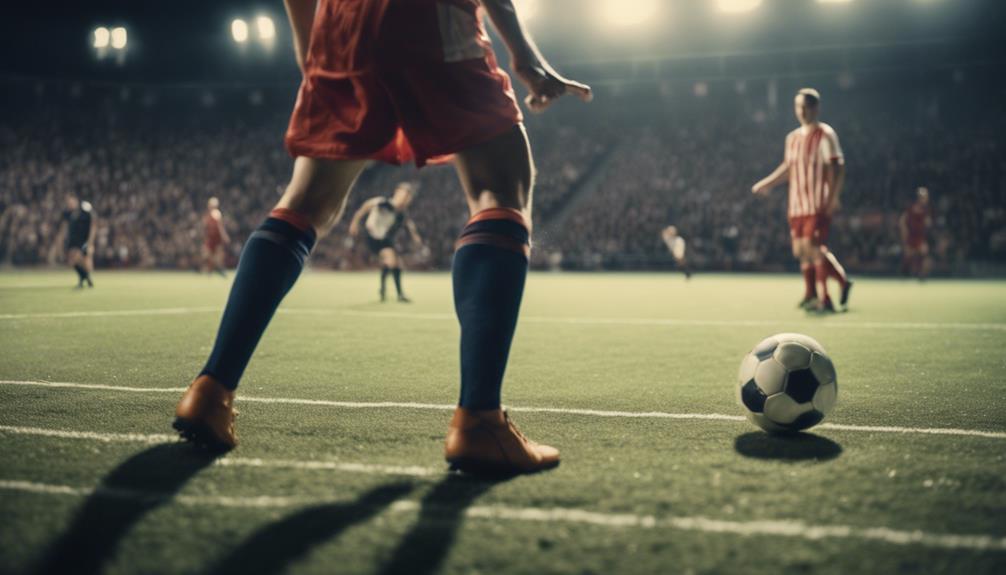
Consider potential revisions to handball laws in response to ongoing criticisms and calls for clearer guidelines to address controversial decisions. The International Football Association Board (IFAB) is contemplating updates to handball laws possibly as early as 2024.
The current interpretations of handball rules have faced significant backlash, prompting discussions about shifting from objective to more subjective rules. Many stakeholders advocate for clearer guidelines to prevent contentious and disputed decisions on the field. Speculation abounds regarding adjustments that could strike a balance between the intent of the player and the fairness of the ruling.
To engage you further, here are four key aspects to ponder regarding the future changes to handball laws:
- Will IFAB's potential updates lead to a more consistent application of handball rules across different leagues?
- How might the shift towards subjective rules impact the way handballs are judged during matches?
- Can clearer guidelines effectively reduce controversies surrounding handball decisions?
- What adjustments could be made to make sure that handball rulings consider both the player's intent and the fairness of the game?
Conclusion
So there you have it – the ins and outs of handball in soccer. Remember, the game is always evolving, so keep an eye out for any changes in the rules.
And hey, don't let a controversial handball call ruin your day – after all, it's just a game. Keep calm and play on!


